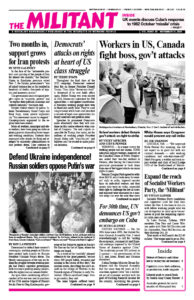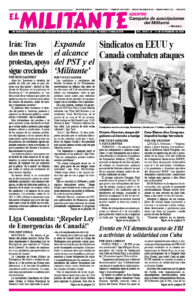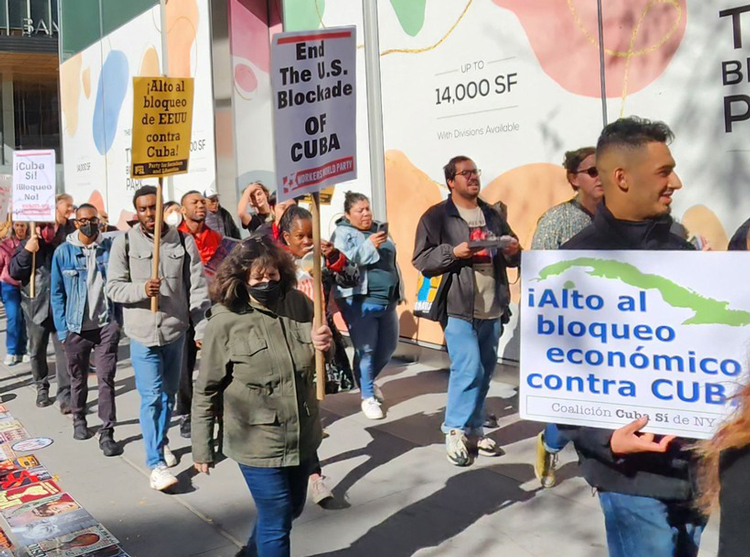UNITED NATIONS — For the 30th time since 1992, the United Nations General Assembly Nov. 3 voted overwhelmingly to call for “ending the economic, commercial and financial embargo imposed by the United States of America against Cuba.” The resolution passed 185 in favor to 2 against — the governments of the U.S. and Israel. Brazil and Ukraine abstained.
Cuban Foreign Minister Bruno Rodríguez told the General Assembly that the more than 60 years of U.S. sanctions against Cuba “are a deliberate act of economic warfare with the goal of blocking financial income for the country, destroying the government’s capacity to meet the needs of the population, causing the collapse of the economy” in hopes of spurring the overthrow of the revolutionary government.
Rodríguez noted that the administration of Joseph Biden has “continued the inhumane policy of ‘maximum pressure’ established during the presidency of Donald Trump,” which added 243 new sanctions.
Among the measures with the biggest impact have been the blocking of international financial transactions. From January 2021 to February 2022 alone, Rodríguez said, there were 642 actions by foreign banks that blocked transactions with Cuba.
“We don’t say the blockade is the cause of all the difficulties we face,” Rodríguez said, pointing to frequent electrical blackouts and shortages of basic necessities. “But anyone who denies its grave effects and does not recognize that it is the principal cause” of the economic problems Cuba faces “isn’t telling the truth.”
The Biden administration in the last few months “has alleviated some of the irrational restrictions on U.S. flights to Cuba, the sending of family remittances and consular services” that had been imposed by Trump. “Those are positive actions, but very limited in their reach and application,” the Cuban foreign minister said. “They don’t modify in any way” the U.S. economic, commercial and financial sanctions.
U.S. rulers’ hostility to Cuba
In fact, he said, “the intensified blockade continues to be the central element that defines U.S. policy toward Cuba.”
That’s been true for every U.S. president for the last six decades, Democrat and Republican alike. The U.S. rulers have never forgiven the Cuban people for bringing down the U.S.-backed dictatorship of Fulgencio Batista in 1959 and replacing it with a government of workers and farmers. That revolutionary government initiated a deep-going land reform that guaranteed land for the peasants, led working people to nationalize U.S. corporations and put them under workers control, and opened the door to a socialist revolution that inspired people around the world.
Only eight days before leaving office, Trump signed an order to put Cuba on the U.S. State Department’s list of “State Sponsors of Terrorism,” which serves to strengthen the economic sanctions. Biden could change that “with just a signature,” Rodríguez said.
The representatives of more then 50 countries took the floor during the two days of debate to support the resolution and to denounce various aspects of Washington’s economic war on Cuba. Many representatives took note of the “extraterritoriality” of the U.S. embargo, which is designed to force other governments around the world to submit to the U.S. sanctions.
Cuba’s internationalism
Despite the U.S. sanctions “and in spite of our own limited resources,” Rodríguez said, “we collaborated in the sending of 58 medical brigades to 42 countries and territories, who joined the more than 28,000 [Cuban] health care professionals” who were already aiding people in 59 countries. The impact of Cuba’s selfless internationalist volunteers was noted by many of the speakers in the debate.
Nerys Nakia Dockery, the representative of Saint Kitts and Nevis, pointed to “Cuba’s benevolence,” by offering the vaccines against COVID-19 it had developed “to those nations unable to afford other, more expensive doses.”
Dockery noted that she is one of the thousands who have been aided by Cuba. In May this year, Cuban doctors operated on her to save her eyesight, free of charge. “I owe my ability to deliver my speech from this platform to Cuba!” she said.
“In the face of such magnanimity, altruism and compassion that can be counted in the many lives saved,” she said, “how can Cuba justifiably continue to be designated by the United States as a State Sponsor of Terrorism?”
John Kelley, a low-ranking “political counselor” from the U.S. mission, took the floor for barely four minutes to “explain” why Washington voted against the resolution.
Kelley cynically proclaimed that Washington is “focused on the political and economic well-being of the Cuban people.” He claimed that the Cuban government unleashed “repression” on “peaceful protesters, journalists and human rights defenders” in the wake of demonstrations in Cuba in July 2021. And he asserted that exemptions to the U.S. sanctions on Cuba has made the U.S. “one of Cuba’s principal trading partners,” exporting $295 million worth of agricultural goods in 2021.
Yuri Gala, Cuba’s deputy ambassador to the U.N., answered Kelley. “Cuba does not need lessons on democracy and human rights, much less from the United States.” (See accompanying article.)


